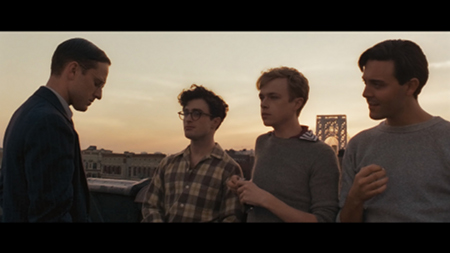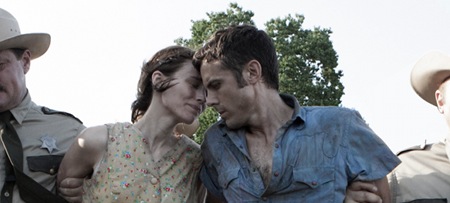Kill Your Darlings, director John Krokidis’s excellent tale of the early beginnings of the Beat Generation writers, pulls us into the world of a very young Allen Ginsberg (Daniel Radcliffe) at the cusp of his coming-of-age, as he breaks free from the hold of his mentally disturbed mother, gets accepted into Columbia, and takes his first tentative steps into exploring a world bigger than Paterson, New Jersey. It’s a world of jazz music and black musicians, hard drugs, and sex, all of which shaped and informed the style of writing that would ultimately come to define him as one of our greatest American counterculture poets.
Krokidis effectively pulls us into this moment in time, when a brilliant young man like Ginsberg could believe he had the power to change the shape of the world with his words and his mind — and further, by working collectively with other brilliant young men like William S. Burroughs and Jack Kerouac, actually create the spark that helped create a counterculture generation that cast aside the values and traditions of the post-WWII era in favor of birthing something born of completely different values. The film introduces us to young Ginsberg as he surprises his father, the poet Louis Ginsberg, with the news that he’s been accepted to Columbia.
Upon his arrival at Columbia, though, he quickly realizes that the staid traditions of that storied institution and, in particular, its insistence upon following structured, formulaic “rules” of writing, chafes against the burning desire Ginsberg has within him to break free from those molds and forge his own path. Early on, he meets a fellow undergraduate, Lucien Carr (Dane DeHaan), and finds him to be a kindred spirit. Carr takes Ginsberg firmly by the hand and pulls him into a fascinating subversive world of drugs, jazz and writing, and together with the older, more worldly William Burroughs (Ben Foster) and eventually Jack Kerouac (Jack Huston), these young aspiring writers challenge themselves and each other to set the world on fire, creating a manifesto of their “New Vision,” the seed of what would come to define the Beats.
The shadow hovering over this story is David Kammerer (Michael C. Hall), an older man who’s as obsessed with Lucien Carr as Ginsberg himself will become. Kammerer controls and clings to Lucien and will not let him go and that, ultimately, leads to the defining moment of the film, Lucien Carr’s well-documented murder of Kammerer, into which Burroughs, Kerouac and Ginsberg himself get pulled. Krokidas could have chosen simply to tell the tale of Ginsberg’s homosexual awakening, but instead he keeps his focus on the young poet’s awakening as a writer, drawn in parallel to Lucien Carr’s relationship with the obsessive Kammerer, who does his level best to put out the fire of the younger mens’ new vision so he can keep Carr to himself. This proves to be a smart choice for this film; Ginsberg’s sexuality is much less interesting to explore than how he came to be this remarkable writer whose poetry – along with the work of Kerouac and Burroughs – would come to define a generation.
Almost everyone has a sexual awakening at some point in their lives, and those stories are something we’ve seen done and overdone; not every young man grows to be the kind of writer who has a work like Howl gestating in his soul, though, and the murder of Kammerer and its aftermath is shown here to be a milestone of sorts in Ginsberg’s life, shaping who he becomes.
That this film works so well is due in no small part to the superb talent onscreen Krokidis’s deft, skillful direction. All of the performances in Kill Your Darlings are superlative. As Lucien, DeHaan radiates complicated, over-privileged tragedy, one minute all soulful puppy eyes and pouty lips, the next icy cold disdain; Huston brings to life the restless energy that defines Kerouac as both a person and a writer; and Foster is remarkable as the droll, bored-with-life-and-bourgeois-privilege Burroughs, who ultimately shrugged that life aside in favor of the deliberate criminality and addiction that in turn informed his own seminal works, Junkie and Naked Lunch.
Radcliffe is a revelation here, casting aside all remnants of the cloak of Harry Potter to fully immerse himself in becoming Allen Ginsberg. Radcliffe flawlessly takes Ginsberg on his journey from naïve middle-class Jersey boy to awakening young writer, from an emerging poet inspired by the casting aside of tradition and structure of Walt Whitman to the early stages of manic creative energy that shaped the influential writer he would grow to become. It’s terrific to see Radcliffe making such smart choices in his post-Harry Potter career, establishing himself as a young actor who’s pushing himself and stretching far beyond what anyone might have imagined.
My only quibbles with the film – and they are small quibbles, relative to how much I enjoyed it overall – are the use of modern music in a film about the Beats (for me, it should be jazz, jazz and more jazz), and one fairly graphic sex scene toward the end of the film that I felt almost edging toward gratuitous, than the scene actually needed to be to underscore its point. Had the focus of this film been more strictly about Ginsberg’s sexual awakening, I probably wouldn’t have felt that way, but as it is, in a film that’s about his awakening as a writer and about the pivotal impact of Carr’s murder of Kammerer, it felt out of place. Even so, I can respect the filmmaker’s choice to push the boundary of the audience’s comfort level, and I certainly can’t deny giving Radcliffe appropriate props for his bravery in going there on the big screen.
Production value is solid throughout, with both cinematography and editing being especially noteworthy. The editing of an early scene in the film, when Ginsberg, encouraged by Carr and Burroughs, gets off on a drug-fueled, manic writing session, effectively evokes the burning passion catching fire within this young, middle-class, would-be poet as he begins shifting toward the fiery, impassioned writer he would become. Overall, Kill Your Darlings is a terrific exploration of the young Beats in their earliest gestation, a lovingly rendered, well-executed ride that immerses the audience in that rare time and place when young people like Ginsberg and his compatriots truly felt they could change the world, when the casting aside of tradition and the challenging of social norms felt relevant, real, and genuinely world changing.













